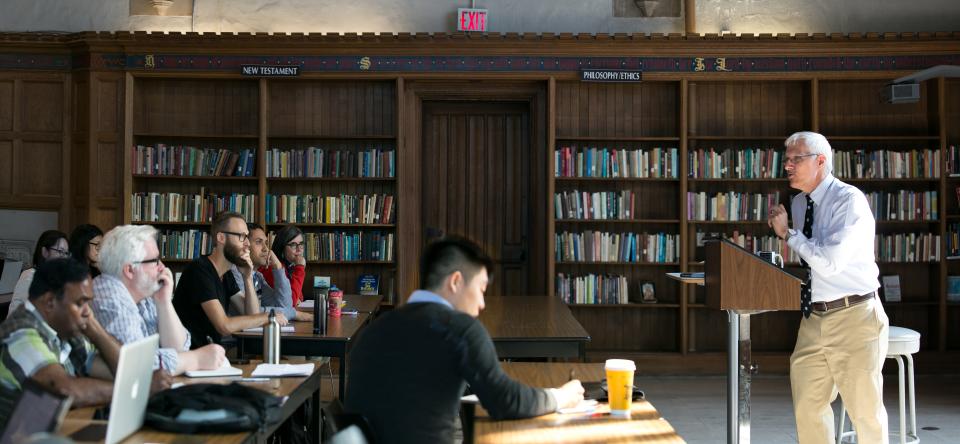In a conversation with some students recently I made reference to Wycliffe College’s Six Principles, and was met with blank stares. I do not fault the students. The fact is that we don’t talk about the Principles nearly as much as we did when I began teaching here in the late 1990s. I therefore decided it might be time to say a word or two about them. As our website helpfully clarifies, Wycliffe’s teaching and ethos articulate “the beliefs and values of evangelical Anglicanism. The term ‘evangelical’ has many current meanings; in the Anglican sense, it refers to the theological wisdom, spirituality, love of Scripture, and commitment to learning characteristic of the Protestant Reformation.”
It is notable that this summary of evangelicalism “in the Anglican sense” is one that would be shared by most Wycliffe students and faculty, whether or not they identify themselves as Anglican. The evangelicalism that matters at Wycliffe is defined by serious commitment to the gospel (the evangel) of Jesus Christ. It is not merely—indeed, it should not be at all—a sociological or political badge of allegiance. Evangelicalism at its best is neither a social marker or a spiritual “brand,” but a renewal movement in service of the one gospel within the one body of Christ. This is true whether one is an Anglican evangelical, a Free Church or a Reformed evangelical, an evangelical Wesleyan or an evangelical Catholic, or any other form of evangelical one might care to name.
Since it would be foolish to try to address all six principles at once, in this blog post I will discuss the first and arguably most important:
- The sufficiency and supremacy of Holy Scripture as the rule of faith.
This is just good Reformation teaching. Scripture is supreme, in the sense that it has the final word over all merely human traditions and customs. In the words of the Anglican Thirty-Nine Articles, of which the Six Principles form a kind of précis: “Holy Scripture containeth all things necessary to salvation: so that whatsoever is not read therein, nor may be proved thereby, is not to be required of [anyone], that it should be believed as an article of the Faith …” (Article VI).
If we would put it in a more contemporary idiom, “Scripture rules.” It is to be preached and prayed on, studied and expounded, honoured and shared. To be sure, what this looks like can differ from one church to another. Historic Anglicanism for instance has generally been less keen on the kinds of theories of inspiration and inerrancy one commonly finds in the Reformed tradition, than on the sheer power of the Word to shape the church’s life in its actual use. But the primacy of the Word is part of our common heritage. If you are ever in Wycliffe’s Great Hall, look up at the coat of arms in the south-facing stained glass window. There you will see the words, Verbum dei manet in aeternum: “the Word of God endures forever” (Isaiah 40:8). That is the Wycliffe ethos in a nutshell.
Now does the fact that “Scripture rules” mean that there are no other sources of authority? Do there exist no other “traditions” that seriously claim our attention and, within limits, allegiance? By no means. No major theologian or Christian body ever thought that one could simply be tradition-less. After all, the Six Principles and the Thirty-Nine Articles from which they are derived are themselves forms of tradition. A putatively tradition-less Christianity would be a Christianity without a history, without a past, without a body. It would be a version of what literary and culture critic Alan Jacobs calls “presentism.” Presentism, he writes, “assumes that the past is rarely if ever a source of instruction or insight—indeed is more typically something to fear and loathe—and can only be of interest in so far as it pleasingly anticipates something that we already (thanks to our contemporaries) know to be true or aggravatingly fails to affirm something we know to be true.”
Among the many ironies of presentism is that it renders us less equipped to address the challenges of the present. It leaves us vulnerable to being “blown about by every wind of doctrine” (Eph. 4:14), or in modern parlance the Zeitgeist. Attempts to rely on “the Bible alone” end up being oddly captive to the cultural moment. They have fewer resources of self-criticism at their disposal, not more. That is why any serious account of biblical authority requires that we listen to the voices of our forebears, whether in the form of church doctrine or theology or theological exegesis.
Scripture rules then, but not in a zero-sum relationship with the Christian past. It may be helpful here to cite a distinction often made in ecumenical theology between Tradition and traditions. Tradition, with a capital “T,” means the one faith that has been handed down from the apostles, and that we, in turn, are enjoined to hand on faithfully. Whereas traditions—small “t,” and often plural—name the more particular and local practices that shape the lives of individual churches. Small-t traditions are not necessarily bad, though they can be—e.g., when they reflect mere cultural prejudice or “the way we’ve always done things” (which in practice often means, “for the past fifteen years”). If so, they need to be reformed—in light of Scripture, as evangelicals would insist. And indeed, loving attention to Scripture is how we come to discern authentic Tradition in the midst of all our traditions. Stated differently, it is in wrestling with Scripture that we come to hear the gospel itself with fresh ears.





